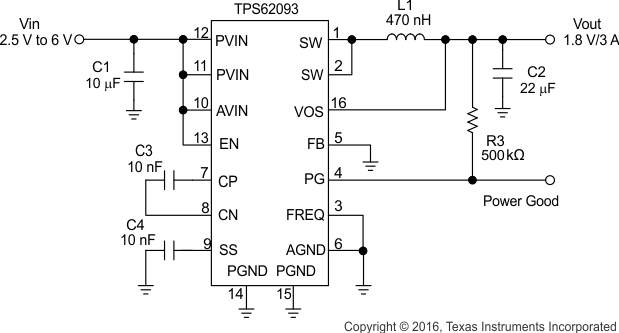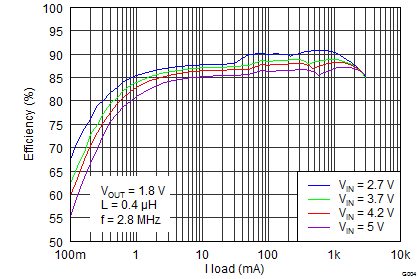SLVSAW2C March 2012 – October 2016 TPS62090 , TPS62091 , TPS62092 , TPS62093
PRODUCTION DATA.
- 1 Features
- 2 Applications
- 3 Description
- 4 Revision History
- 5 Device Comparison Table
- 6 Pin Configuration and Functions
- 7 Specifications
-
8 Detailed Description
- 8.1 Overview
- 8.2 Functional Block Diagram
- 8.3
Feature Description
- 8.3.1 Enable and Disable (EN)
- 8.3.2 Softstart (SS) and Hiccup Current Limit During Startup
- 8.3.3 Voltage Tracking (SS)
- 8.3.4 Short Circuit Protection (Hiccup-Mode)
- 8.3.5 Output Discharge Function
- 8.3.6 Power Good Output (PG)
- 8.3.7 Frequency Set Pin (FREQ)
- 8.3.8 Undervoltage Lockout (UVLO)
- 8.3.9 Thermal Shutdown
- 8.3.10 Charge Pump (CP, CN)
- 8.4 Device Functional Modes
- 9 Application and Implementation
- 10Power Supply Recommendations
- 11Layout
- 12Device and Documentation Support
- 13Mechanical, Packaging, and Orderable Information
1 Features
- 2.5 V to 6 V Input Voltage Range
- DCS-Control™
- 95% Converter Efficiency
- Power Save Mode
- 20 µA Operating Quiescent Current
- 100% Duty Cycle for Lowest Dropout
- 2.8 MHz/1.4 MHz Typical Switching Frequency
- 0.8 V to VIN Adjustable Output Voltage
- Fixed Output Voltage Versions
- Output Discharge Function
- Adjustable Softstart
- Hiccup Short Circuit Protection
- Output Voltage Tracking
- Pin-to-pin compatible with TPS62095
2 Applications
- Distributed Power Supplies
- Notebook, Netbook Computers
- Hard Disk Drivers (HDD)
- Solid State Drives (SSD)
- Processor Supply
- Battery Powered Applications
3 Description
The TPS6209x devices are a family of high frequency synchronous step down converters optimized for small solution size, high efficiency and suitable for battery powered applications. To maximize efficiency, the converters operate in pulse width modulation (PWM) mode with a nominal switching frequency of 2.8 MHz/1.4 MHz and automatically enter power save mode operation at light load currents. When used in distributed power supplies and point of load regulation, the devices allow voltage tracking to other voltage rails and tolerate output capacitors ranging from 10 µF up to 150 µF and beyond. Using the DCS-Control™ topology the devices achieve excellent load transient performance and accurate output voltage regulation.
The output voltage start-up ramp is controlled by the softstart pin, which allows operation as either a stand-alone power supply or in tracking configurations. Power sequencing is also possible by configuring the enable and power good pins. In power save mode, the devices operate at typically 20 µA quiescent current. Power save mode is entered automatically and seamlessly maintaining high efficiency over the entire load current range.
Device Information(1)
| DEVICE NAME | PACKAGE | BODY SIZE (NOM) |
|---|---|---|
| TPS62090 | QFN (16) | 3.00 mm x 3.00 mm |
| TPS62091 | ||
| TPS62092 | ||
| TPS62093 |
sp
sp
Typical Application Schematic

Efficiency vs Output Current
